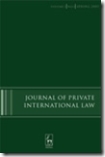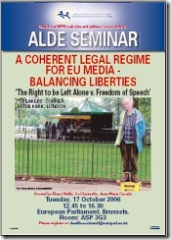Justice and Home Affairs Council Session in Luxembourg (19-20 April 2007)
On 19 and 20 April the JHA Council will hold its 2794th session in Luxembourg, under the German Presidency. On the agenda for the “Justice” issues, scheduled for Thursday 19th, there are a number of points dealing with cooperation in civil law matters, both under the “A” items (on which the Council decides without discussion, since an agreement has previously been found in the Committee of Permanent Representatives – COREPER) and under the “B” items (that are actively debated in the Council: see the agenda for the meeting).
As regards the “A” points, two important deliberations will take place on private international law issues (see the list of public deliberations released by the Press Office of the Council):
- Amended proposal for a Regulation of the European Parliament and of the Council on the service in the Member States of judicial and extrajudicial documents in civil or commercial matters, amending Council Regulation (EC) No 1348/2000: the amended proposal adapts the original Commission proposal to the general agreement of the Council and to the opinion of the European Parliament in a codified version;
- Proposal for a Regulation of the European Parliament and the Council on the law applicable to non-contractual obligations (Rome II): Non-approval of the European Parliament’s amendment (see the related section of our site).
As regards the “B” items, the first three points deal with cooperation in civil matters (Rome I, Rome III and the Regulation on maintenance obligations); in addition, as a last point the Council will discuss further proceedings of the works on a Common Frame of Reference for European contract law.
Here’s an excerpt of the Background Note prepared by the Press Service of the Council: for each draft instrument we have added the latest available Council public document.
Rome III (Jurisdiction and applicable law in matrimonial matters: see the related section of our site)
At the informal meeting in January 2007 in Dresden, ministers underlined the importance of family law issues for the creation of a true area of justice, as there are more and more families where the spouses come from different countries.
Some progress has been achieved since then on this proposal in the sense that a common understanding on a number of important questions is emerging among a majority of Member States. Some delegations have doubts about the added value of this proposal, but the Presidency believes that it is important to continue the discussions in order to find a solution acceptable to all delegations.
The Council will discuss a number of issues with a view to clarifying certain elements of this file and to finding a solution acceptable to all delegations. In particular, the Council will discuss the question of the choice of court by the parties and the choice of applicable law.
Latest available document of the Council: doc. n. 5274/07 of 12 January 2007 (text of the Regulation as drafted by the Presidency on the basis of the meetings of the Committee on Civil Law Matters (Rome III) and the comments made by Member States delegations).
Jurisdiction, applicable law, recognition and enforcement of decisions and cooperation in matters relating to maintenance obligations (see our related posts here and here)
The Council is expected to agree on some political guidelines on issues of particular importance for the continuation of the work on this draft regulation. […]
[T]he shared will to move forward in such an important area as maintenance obligations was highlighted at the informal meeting of Justice and Home Affairs Ministers in Dresden on 15 and 16 January 2007.
The Council should focus its discussion on:
- the abolition of the exequatur procedure for all maintenance obligation decisions covered by the Regulation, which would reduce the costs involved in enforcement of maintenance decisions and improve the position of creditors by speeding up enforcement of decisions and making them more easily portable within the European Union;
- the introduction of a system of cooperation between central authorities in order to facilitate application of the Regulation;
- making it clear in a recital that the Regulation applies only in situations having cross-border implications and hence an international aspect, and
- the conditions on which Member State may retain or conclude agreements with third countries in this particular area.
Latest available document of the Council: doc. n. 16830/06 of 20 December 2006 (available in German: text of the Regulation as drafted by the Finnish and German Presidency on the basis of the meetings of the Committee on Civil Law Matters (Maintenance Obligations) and the comments made by Member States delegations).
Rome I (see the related section of our site)
[…] Although most of the text is agreed by all delegations, there are some elements on which there is still not yet unanimity. With this aim, the Council is expected to examine a compromise package submitted by the Presidency.
The following questions will be particularly examined: the principle of choice of law by the parties to the contact, the law applicable in the absence of choice and individual employment contracts.
Latest available document of the Council: doc. n. 6935/07 of 2 March 2007 (French or German text of the Regulation as drafted by the Presidency on the basis of the meetings of the Committee on Civil Law Matters (Rome I) and the comments made by Member States delegations).
European Contract Law
The Council is invited to decide that a Council position on a common frame of reference for European contract law, in particular as regards its purpose, content and scope, is developed and defined. […]
In 2006 the European Parliament expressed its views in two Resolutions. The Commission has announced that it will submit a second Progress Report on European Contract Law and the Acquis Review. The Research Network will produce a draft by the end of 2007. In view of the importance of the project the Presidency considers that it would be appropriate for the Council to develop and define its own position. In this context, the Presidency suggests that the Council identifies the issues that require careful examination and proposes a method of work within the Council preparatory bodies.
(Many thanks to Martin George, for his collaboration in hunting down some of the documents referred to above)

